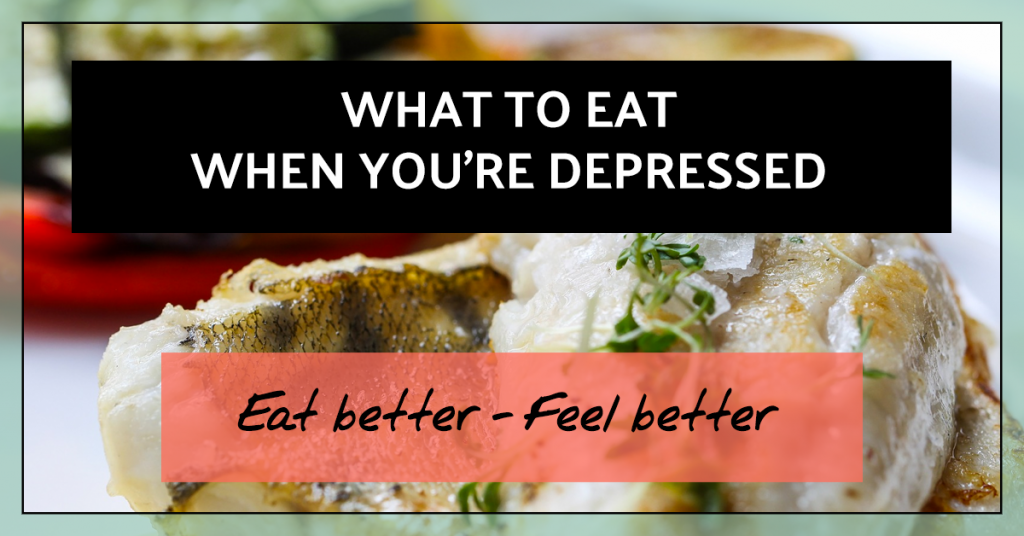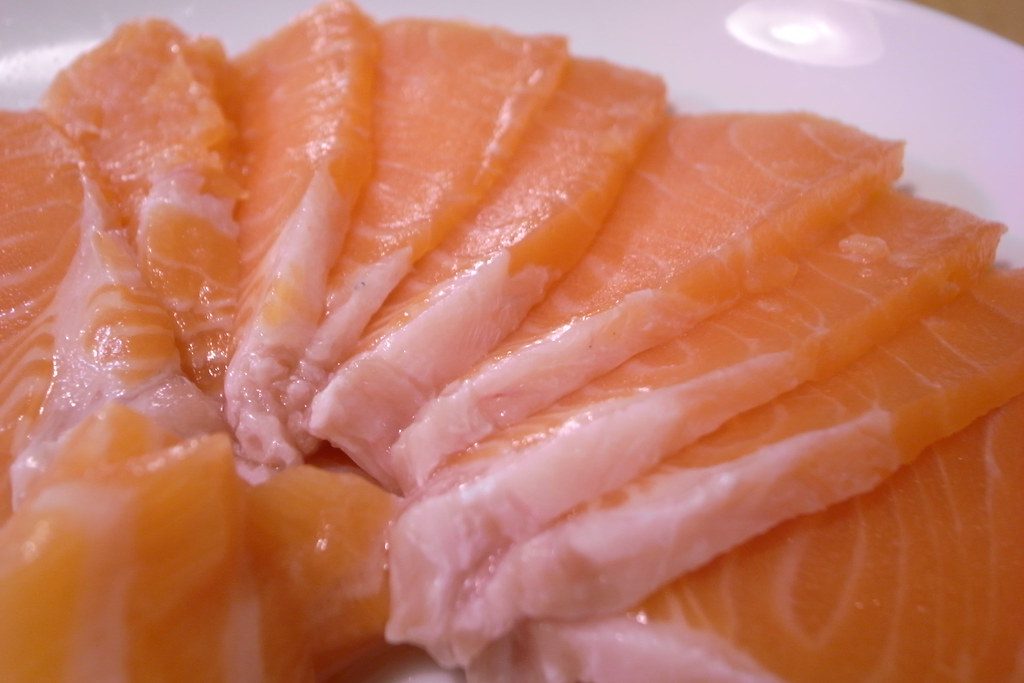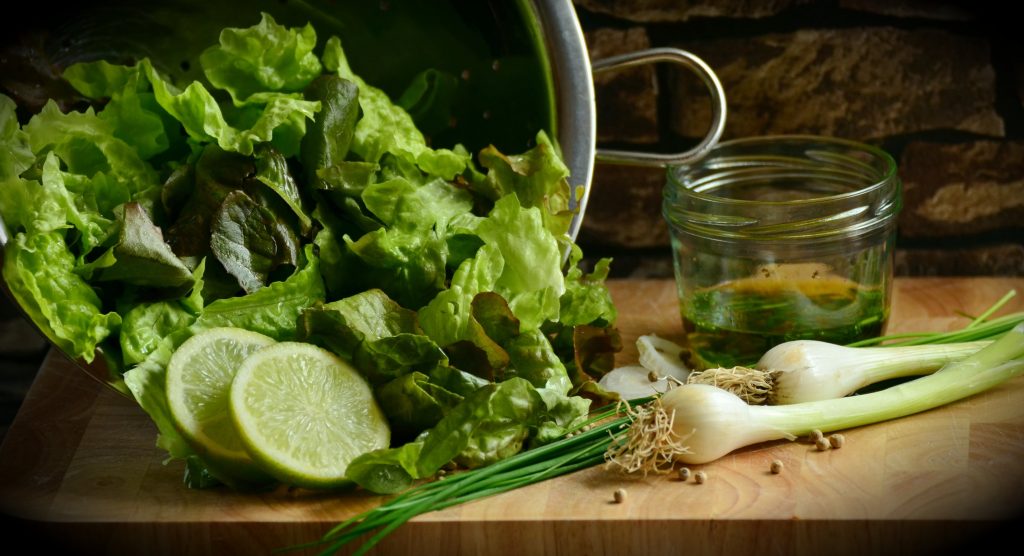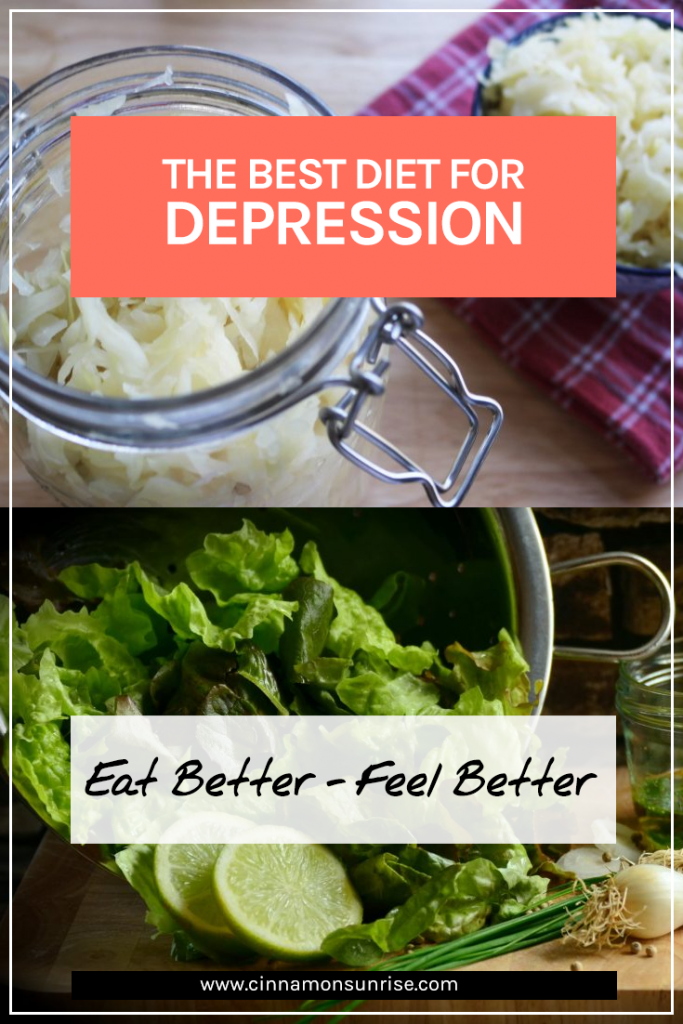This post may contain affiliate links. If you click on an affiliate link and buy something, I get a percentage of the sale. Find out more by reading my affiliate policy and disclosure.
Let me start with the bad news. You can’t cure your depression by eating a stalk of broccoli.
Sorry.
And, as I talked about in my post about how clean eating fed my depression, trying to achieve a ‘perfect’ diet can make depression and anxiety worse, not better.
Now for the good news! There is a lot of research about the link between diet and depression. Eating a nourishing and anti-inflammatory diet can absolutely help us to improve our mood and manage our depression.

In this post I will cover the best things to eat to help with depression, but I’m going to start with some research.
Diet and depression
The link between inflammation and mood
An inflammatory diet is linked to a higher risk of being diagnosed with depression. A 2014 study looked at inflammatory dietary pattern and risk of depression among women and concluded that:
The inflammatory dietary pattern is associated with a higher depression risk. This finding suggests that chronic inflammation may underlie the association between diet and depression.
And a 2018 review of research looked at the role of an anti-inflammatory diet as a potential intervention for depressive disorders and noted that:
A significant association between a pro-inflammatory diet and increased risk of depression diagnosis or symptoms was evident, relative to those on an anti-inflammatory diet.
What is an anti-inflammatory diet? Well, some foods contribute to inflammation and some fight it. Not surprisingly, sugar, fried foods, refined carbs and processed meats contribute to inflammation. Meanwhile, olive oil, tomatoes, leafy greens, and fruit helps to reduce inflammation.
There are strong links between inflammation and depression, with chronic inflammation e.g. from infection a risk factor for major depression. (However, depression is a complex disease! It has a myriad of risk factors.)
Nutrients and depression
Specific nutrients are crucial in helping people achieve better mood. Note that scientific research involving food and diet is complex due to it being almost impossible to tweak one specific nutrient and see the results. However, we can find some broad patterns!
Omega-3 and depression
Omega-3 are fatty acids that you get from oily fish and some seeds and nuts. Several studies show that “Omega-3 fatty acids were shown to be more effective than placebo for depression in both adults and children”.
Good sources of omega-3 include:
- Fatty fish such as salmon, tuna, herring, sardines
- Nuts and seeds such as flaxseed, hemp, walnuts and chia seeds
- Plant oils such as flaxseed oil and hemp oil

Vitamin D and depression
Multiple studies have linked low levels of vitamin D to depression. The best source of Vitamin D is sunshine. However, in colder countries or in the winter you should take a supplement. Supplements have been shown to help symptoms of depression.
Good sources of vitamin D include:
- Sitting out in the sun for an hour
- Fatty fish such as salmon, tuna, herring, sardines
- Liver
- Egg yolks
- Supplements
Folate, B12 and depression
Low levels of folate (one of the B vitamins) and B12 are linked to depression. One study recommended that people with depression take oral supplements of both folate and B12.
On the basis of current data, we suggest that oral doses of both folic acid (800 microg daily) and vitamin B12 (1 mg daily) should be tried to improve treatment outcome in depression.
Good sources of folate include:
- Leafy green vegetables, including spinach, broccoli and lettuce
- Beans, peas and lentils
- Lemons, bananas, melons
Good sources of B12 include:
- Meat
- Salmon and cod
- Dairy, including milk, cheese and eggs
- Supplements

The Gut Microbiome and Depression
Trillions of microorganisms live in your digestive system and make up your gut microbiome. These colonies of microorganisms differ from person to person, and can be influenced by many factors, including diet. The exciting part? There is a ton of research that shows that the gut can influence the brain through something called the gut-brain axis. That means that what (and how) we eat can influence our mood and our thoughts!
Probiotics and depression
Have you heard of probiotics? They are a hot new area of nutritional research, but people have been eating probiotic foods such as kimchi and sauerkraut for centuries. Probiotics feed the gut microbiome, and there seems to be a link between the health of the microbiome and the brain. For example, a scientific review concluded that probiotics “have a potential role to play in reducing the risk of depression”.
Good sources of probiotics include:
- ‘Live’ yoghurt or kefir
- Sauerkraut
- Kimchi
- Miso
- Pickles

High fibre diets and depression
High fibre diets are associated with a lower risk of depression. Another study looked at the overall health of the gut and concluded that:
High-quality diets, prebiotics, and probiotics may beneficially affect mood. Habitual diets rich in dietary fiber and omega-3-polyunsaturated fatty acids may be linked to reduced risk of developing symptoms of depression, anxiety, and stress.
Good sources of fibre include:
- Bran
- Whole grains
- Oats and barley
- Beans, lentil, chickpeas and other pulses
What to eat for depression?
How does that research translate into a real diet for depression?
Basically, you should be eating:
- Turmeric, dark chocolate, cherries, broccoli, avocado, green tea (anti-inflammatories)
- Oily fish, seeds and nuts (Omega-3)
- Legumes, leafy greens, eggs, asparagus and beets (folate)
- Liver, beef, oily fish, and chicken (b12 – if you are a vegetarian, you need a b12 supplement)
- Kimchi, kombucha, sauerkraut, yogurt, kefir (probiotics)
- Oats, legumes, whole grains, fruit and vegetables (fibre)
And, you should also be getting out into the sunshine every day, or supplementing with Vitamin D.
The good news is that this diet isn’t just good for depression – it’s a well-rounded diet that will help prevent a host of health problems.
An example 5 day ‘diet for depression’ meal plan
These are just ideas to act as inspiration, feel free to rearrange the meals or repeat them – there’s no harm in eating porridge every day for breakfast!
Day 1:
- Breakfast – porridge with berries, green tea
- Snack – probiotic yoghurt topped with seeds
- Lunch – chicken and kale salad with an olive-oil and vinegar dressing and some fruit
- Dinner – red lentil daal, brown rice and curried vegetables
Day 2:
- Breakfast – berry and probiotic yoghurt smoothie with oats, green tea
- Snack – Apple slices with almond butter
- Lunch – minestrone soup and brown bread
- Dinner – Salmon, spelt, and broccoli
Day 3:
- Breakfast – scrambled eggs, smoked salmon and tomato, green tea
- Snack – Banana
- Lunch – Three bean salad and yoghurt
- Dinner – Chicken and vegetable curry with brown rice
Day 4:
- Breakfast – Yoghurt, berry, granola parfait, green tea
- Snack – Celery with hummus
- Lunch – Lentil and spinach soup and brown bread
- Dinner – Jacket potato with beans and side salad
Day 5:
- Breakfast – Beans on toast, green tea
- Snack – Greek yoghurt
- Lunch – Smoked salmon and avocado sandwich, fruit
- Dinner – Liver and apple salad with blackberry dressing
The right diet for depression
As I said at the start of my post, you can’t eat a stalk of broccoli and expect your depression to go away. However, by making sensible food choices and improving the quality of what you eat you can influence your overall mood. Rebuilding your gut microbiome takes time and effort – but can be worth it.
Eating well is a big part of self-care. But it’s not the only part. Check out my self-care checklist for depression if you’re looking for other small and practical things you can do to feel better.
Pin this ‘Best Diet for Depression’ post for later!
